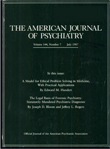Dartmouth Assessment of Lifestyle Instrument (DALI): A Substance Use Disorder Screen for People With Severe Mental Illness
Abstract
OBJECTIVE: Despite high rates of co-occurring substance use disorder in people with severe mental illness, substance use disorder is often undetected in acute-care psychiatric settings. Because underdetection is related to the failure of traditional screening instruments with this population, the authors developed a new screen for detection of substance use disorder in people with severe mental illness. METHOD: On the basis of criterion (“gold standard”) diagnoses of substance use disorder for 247 patients admitted to a state hospital, the authors used logistic regression to select the best items from 10 current screening instruments and constructed a new instrument. They then tested the validity of the new instrument, compared with other screens, on an independent group of 73 admitted patients. RESULTS: The new screening instrument, the Dartmouth Assessment of Lifestyle Instrument (DALI), is brief, is easy to use, and exhibits high classification accuracy for both alcohol and drug (cannabis and cocaine) use disorders. Receiver operating characteristic curves showed that the DALI functioned significantly better than traditional instruments for both alcohol and drug use disorders. CONCLUSIONS: Initial findings suggest the DALI may be useful for detecting substance use disorder in acutely ill psychiatric patients. Further research is needed to validate the DALI in other settings and with other groups of psychiatric patients. (Am J Psychiatry 1998; 155:232–238)



